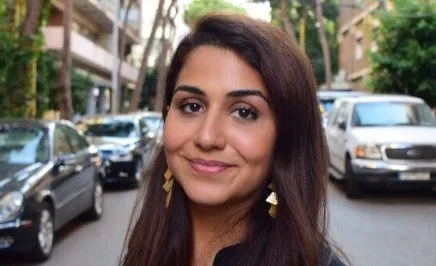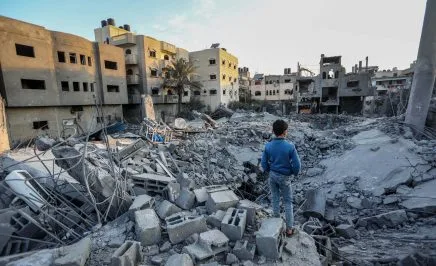After another year of defending human rights around the world, Agnès Callamard, Amnesty International’s Secretary General, shares her reflection on 2023:
I never expected the state of human rights to lead me to reference the 1980s sci-fi film Back to the Future. Yet here we are. A world spiralling through time, hurtling backwards past the 1948 promise of universal human rights, even as it spins ever faster forwards into a future overtaken by Big Tech and unregulated generative artificial intelligence (AI).
“Authoritarian” practices on the rise
In 2023, V-Dem, the political science research centre, found the number of people living in democracies (broadly defined as countries providing rule of law, constraints on the executive by the legislature and the judiciary, and respect for civil liberties) had regressed to 1985 levels: to levels before the Berlin Wall fell, before Nelson Mandela was released from prison, before the Cold War ended in the hope that a new era for humanity was about to unfold.
That new era was all too brief and today is as good as gone. Evidence of its passing grew in 2023. “Authoritarian” practices and ideas permeated many governments and societies. North to south, east to west, authoritarian policies ate away at freedoms of expression and association, hit out at gender equality, and eroded sexual and reproductive rights.
The underlying public narratives, based in hatred and rooted in fear, encroached on civic space and demonized marginalized individuals and groups, with refugees, migrants and racialized groups bearing the brunt.
The backlash against women’s rights and gender equality intensified in 2023, with many of the past 20 years’ gains under threat.
In Afghanistan, society has de facto criminalised being a woman or a girl. In 2023, the Taliban passed dozens of official decrees aimed at erasing women from public life. Similarly in Iran, the authorities continued their brutal suppression of “Woman, Life, Freedom” protests and issued hate-ridden official statements calling the unveiling of women a “virus”, a “social illness” and a “disorder”.
In the USA, 15 states implemented total bans on abortion, or bans with extremely limited exceptions, bringing disproportionate impacts on Black and other racialized people. In Poland, at least one woman died because the law denied her the abortion services she needed. Uganda adopted a harsh anti-gay law, while social and political leaders in the US also promoted anti-trans narratives, policies and regulations.
Although the world has never been wealthier, 2023 was, as the World Bank called it, “the year of inequality”. In settings as diverse as the UK, Hungary and India, defenders of economic and social rights were among the activists most widely targeted. Climate activists were branded “terrorists” for denouncing governments expanding fossil fuel production and investment. Critics of governments’ handlings of the economy in the Middle East, trade unions in Asia-Pacific were silenced and arbitrarily detained, as were those combating corruption in West Africa.
Back to pre-1948?
However, in 2023, our metaphorical time machine also tossed us much further back than 1985 : a descent into a hell whose gates had been bolted closed in 1948. “Never again”, the world had declared in the aftermath of global warfare with its some 55 million civilian deaths, when faced with the abject horror of a Holocaust that saw the extermination of six million Jews and millions of others.
Yet in 2023, the “never again” moral and legal lessons were torn into a million pieces. Following the horrific crimes perpetrated by Hamas on 7 October 2023 – when over 1,000 people, mostly Israeli civilians, were killed, thousands wounded, and 245 people taken hostage – Israel instigated a campaign of retaliation that became a campaign of collective punishment. It is a campaign of deliberate, indiscriminate bombings of civilians and civilian infrastructure, of denial of humanitarian assistance and an engineered famine.
By the end of 2023, 21,600 Palestinians, mostly civilians, had been killed in the unrelenting bombardment of Gaza, with thousands more missing, believed buried under the rubble. Much of Gaza’s civilian infrastructure has been obliterated, while nearly 1.9 million Palestinians have been internally displaced and deprived of access to adequate food, water, shelter, sanitation and medical assistance.
To be a Palestinian in Gaza today is to be plunged to a far more violent and destructive version of the 1948 “Nakba” or the “catastrophe”, when more than 750,000 Palestinians were forcibly displaced
For millions the world over, Gaza now symbolizes utter moral failure by many of the architects of the post-World War Two system; their failure to uphold the absolute commitment to universality, our common humanity and to our “never again” commitment. The principles enshrined in the UN Charter, the Geneva Conventions, the Genocide Convention, and international human rights law have been dishonoured. That’s clearest in the case of the Israeli authorities. However, Israel is not alone. The USA too has played a leading part, as have some of Europe’s leaders and the EU leadership. So too have those who continue to send arms to Israel, all who failed to denounce Israel’s relentless violations and those who rejected calls for a ceasefire.
Their conduct exemplifies the double standards that Amnesty International has denounced over many years. Yet, powerful actors have now gone further, demonstrating a willingness to put at risk the entirety of the 1948 rule-based order, stripping down the founding principles of common humanity and universality and thus stripping away our global capacity to prevent the very worst.
It all comes hot on the heels of Russia’s full-scale invasion of Ukraine, a violation of the UN Charter and an undermining of the international rule of law. Russia’s aggression has continued to manifest itself in deliberate attacks against civilians, the killing of thousands, and as widespread destruction of civilian infrastructure, including Ukraine’s grain storage and export facilities.
China too, another permanent member of the UN Security Council, has acted against international law, by protecting the Myanmar military and its unlawful air strikes, through its practices of arrest and torture, and by shielding itself from international scrutiny for the crimes against humanity it continues to commit, including against the Uighur minority.
The future we don’t want
In 2023, with the much earlier-than-expected launch of ChatGPT-4 and other generative AI tools, we were also thrust faster into the future. If the tech-related abuses witnessed in 2023 are anything to go by, prospects for our future are chilling indeed.
Tech is enabling pervasive erosions of rights: perpetuating racist policies, enabling spreading of and the curtailing of freedoms of expression. Big Tech ignored or minimized those harms, even in armed conflicts contexts such as in Ethiopia, Israel and the Occupied Palestinian Territories, Myanmar and Sudan. With the alarming rise in online incitement and other harmful content against both Palestinian and Jewish communities, Europe and the USA also saw marked increases in anti-Muslim and antisemitic hate crimes.
In 2023, States turned increasingly to facial recognition technologies to aid policing of public protests, sporting events and of marginalized communities at large – migrants and refugees in particular. Abusive technologies were relied upon for migration governance and border enforcement, including through, border externalization technologies, data software, biometrics and algorithmic decision-making systems.
Despite years of evidence of the human rights violations it enables, spyware remained largely unregulated. In 2023, Amnesty International uncovered use of Pegasus spyware against journalists and civil society activists in Armenia, the Dominican Republic, India and Serbia, while EU-based spyware was sold to states the world over. In response, the European Parliament adopted a resolution in November 2023, criticizing the lack of action to curb abuses by the spyware industry.
However, with tech-outlaws and their rogue technologies left to freely roam the digital Wild West, such human rights violations are likely to escalate in 2024, a landmark electoral year. It is a foreshadowing of a future that is already upon us.
Global solidarity
Human rights regressions in 2023 did not go unseen. To the contrary. People around the world have stood up to regression, demonstrating unprecedented global solidarity.
The Israel-Hamas conflict sparked hundreds of protests worldwide, with millions protesting civilian deaths, calling for the release of hostages, demanding a cease fire.
The UN Secretary-General, heads of UN agencies, and humanitarian organizations took unprecedented steps to denounce war crimes committed in southern Israel and Gaza and to call on Israel to respect international law.
The late 2023 UN General Assembly resolutions calling for a ceasefire were adopted with a huge majority while South Africa filed an application before the International Court of Justice, alleging that Israel’s conduct in Gaza violated the 1948 Genocide Convention and insisting on the centrality of the post-World War Two international rule-based system.
2023 saw momentum build towards a global regime for fairer taxation, to help prevent tax evasion and avoidance and mobilize resources for lower-income countries. In November, against the wishes of the richer countries, the UN General Assembly adopted a resolution tabled by the Africa Group establishing an international committee to draft a UN tax convention by June 2025.
In 2023, there were many people who resisted and disrupted forces pushing the world backwards to the conditions of 1985 and of pre-1948; people who marched and protested against forces that would propel us all into a future not of our design. They too have shaped 2023, against all odds.
I hope that in 2048 – or even 3048 – when diplomats and activists look back at the past year, they will find that there were many, many good people around the world who did all they could. Who stood up and spoke out. For the sake of our common humanity.
Agnès Callamard, Secretary General





